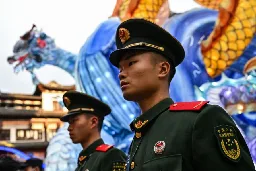China’s overseas policing: With investments stalled or collapsed and a growing resentment at the role of Chinese firms in the Global South, Beijing seems to conclude that they are dangerously exposed
China’s overseas policing: With investments stalled or collapsed and a growing resentment at the role of Chinese firms in the Global South, Beijing seems to conclude that they are dangerously exposed
Even the most thuggish admirers of the China model should pause for thought, because the Chinese communist party, self-interest is paramount.

At a less well-reported meeting in Beijing late last year, organised by the China-Africa Business Council, officials pushed for the rapid expansion of Chinese private security firms [in countries of the Global South]. ‘Outbound Chinese investors face security challenges and a complex environment,’ said an official statement.
[...]
Officials are concerned about the fate of programmes under China’s Belt and Road Initiative (BRI), which started as a global infrastructure programme, but has evolved into an umbrella for just about everything China does overseas to further its influence. Projects have stalled or collapsed under a mountain of unsustainable debt and growing resentment at the outsize role of Chinese firms and labour. In Pakistan, for instance, Gwadar Port, built by China as key part of a $62 billion (£47 billion) China-Pakistan economic corridor has been under virtual siege by Baloch separatists, who have targeted Chinese engineers. Chinese-owned mines in the Democratic Republic of Congo have also been targeted.
A BRI working group recently highlighted the need to ‘hammer out the safety protection in a detailed way,’ according to the state-owned Xinhua news agency.
[...]
China now has overseas economic investments and assets worth well over a trillion dollars by most estimates. It has set up around 47,000 overseas firms across 190 countries or regions, according to the Ministry of Commerce.
[...]
Beijing now seems to have concluded that they are dangerously exposed, particularly at a time of growing economic stress and geopolitical tensions and require a local security apparatus to match.
[...]
The Solomon Islands provide a template for China. Last year, they signed a deal on police cooperation with Beijing as part of an upgrade of their relations to a ‘comprehensive strategic partnership’. The Chinese telecoms company Huawei is building a cellular network on the Islands, and a Chinese state company plans to redevelop the port in the capital, Honiara.
[...]
China had less success with Thailand, where the government scrapped plans for joint patrols with Chinese police in popular tourist spots following criticism that it compromised Thai national sovereignty, and a rebuke from the country’s police chief. There was also anger on social media. ‘Thailand will become a complete surveillance state’, was one typical response, though among other autocrats more welcoming of Chinese, that seems to be precisely the point.